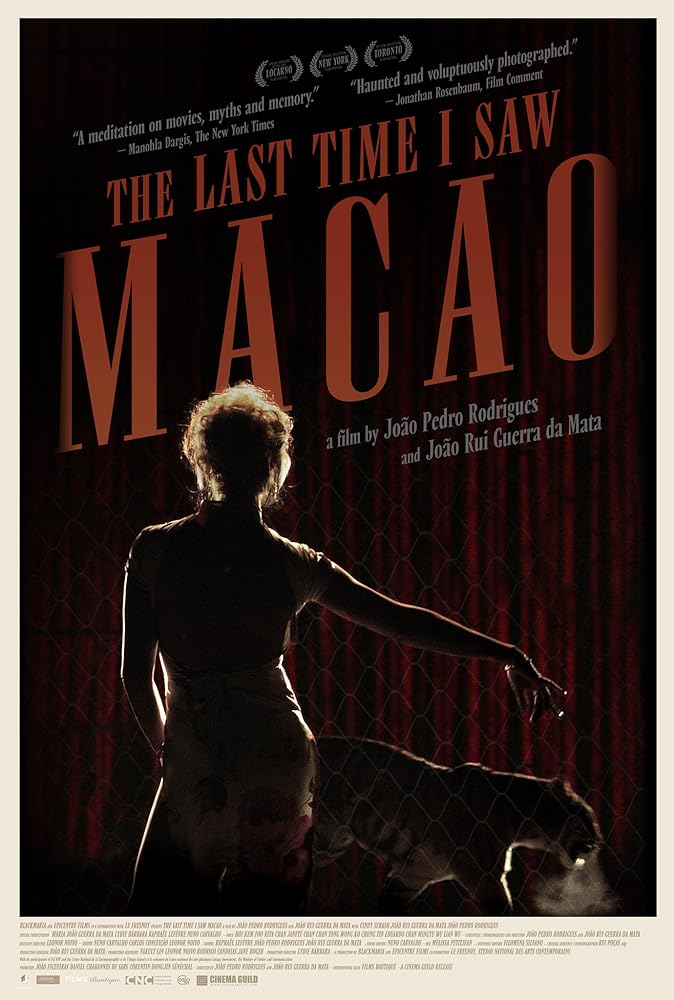
THE LAST TIME I SAW MACAO (A ULTIMA VEZ QUE VI MACAU)
(director/writer: João Pedro Rodrigues/João Rui Guerra da Mata; cinematographers: João Pedro Rodrigues/João Rui Guerra da Mata; editors: Raphaël Lefèvre/João Pedro Rodrigues/João Rui Guerra da Mata; cast: Cindy Scrash (Candy), João Rui Guerra da Mata, João Pedro Rodrigues; Runtime: 85; MPAA Rating: NR; producers: João Figueiras/Daniel Chabannes de Sars/Corentin Dong-jin Sénéchal; Cinema Guild; 2012-Portugal/France-in Portuguese/Cantonese/English, with English subtitles)
“A most enriching cinematic experience that challenges you intellectually.”
Reviewed by Dennis Schwartz
Avant-garde Portuguese directors João Pedro Rodrigues and João Rui Guerra da Mata(“To Die Like a Man“) collaborate again to direct this arty experimental crime drama that revisits in its uniquely weird and scintillating way the 1952 Macao that Josef von Sternberg filmed. It starred Jane Russell and Robert Mitchum. Familiarity with that Hollywood classic film noir is not necessary in clearing up some of the sinister mystery taking place in the modern-day Red Chinese controlled Macao. The stylishly shot enigmatic film gives props in its non-narrative directing approach to fellow Portuguese filmmaker Miquel Gomes, as well as the iconic French film-making figure of Chris Marker. The abstract art-house pic blew me away with its shape-shifting visuals, the intensity of its shadowy crime story, its nostalgia for the old Portuguese colony and the gripping way it blends together a voice-over docudrama, essay film, apocalyptic film, film noir and personal travelogue tale.
It stylishly opens with drag-queen Candy (Cindy Scrash), at a hotel casino onstage with tigers moving around a cage, scantily clad as she is lip-syncing her impersonation of Jane Russell’s sultry version of “You Kill Me” from the 1952 Macao. The next shot is of a paintball war game exercise among soldiers, where one soldier gets killed. The next mise-en-scene has one of the co-directors, Guerra de Mata, whose face is never clearly seen, receiving an email from his long-lost childhood friend Candy that she’s in trouble again over choosing another wrong man and asks him to leave Portugal and visit her immediately in Macao to help. The Portuguese native, de Mata, reminisces about the island he was raised in but has not been back to for the last 30 years. Arriving in a Macao that was for 400 years, since the mid-16th century, a Portuguese colony but in 1999 became a special territory of thePeople’s Republic of China, and is now a strangely crowded place known for gambling, religious cult groups and tourism. The visitor gets stuck in traffic and exits the taxi, but gets lost walking and can’t find the sex shop where Candy sent a messenger to meet him to deliver him to her. Back in the hotel the visitor finds that he loses contact with her, as her mobile is shut off and can do little until further contact is made than be a tourist. The visitor observes his former school has been replaced by a rubbish dump and that this Macao has many stray wild dogs, there are giant toy tigers everywhere in the streets because of the Chinese influence, that the privileged Chinese tourist takes the place to be their first taste of the West, and that he can’t find anyone who speaks Portuguese despite its long influence here. Fearing Candy has been kidnapped by an obscure but violent Zodiac cult, all the visitor can do is search for Candy in the back alleys of this dark foreboding urban terrain and hope for the best (which I guess, is the pic’s theme of the uncertain futures of both Macao and Portugal).
It’s an hypnotic lyrically visual film, that I’m afraid not too many casual viewers will favorably respond to its rarefied arty approach. But for those that do, they will find it a most enriching cinematic experience that challenges you intellectually.Most of the action takes place off-screen.But be warned, if you’re looking for a pic that wraps things up, stay clear of this film–it thrives on false starts and letting you know as little as possible as to what is going down (which might not necessarily be such a good thing).
REVIEWED ON 4/9/2014 GRADE: B+